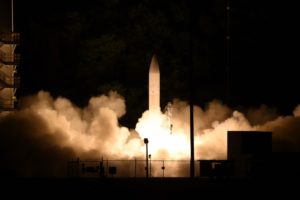Peraton said Monday the company has received a two-year, $44 million deal to support interservice hypersonic weapon flight tests.
Under the deal, awarded by the Army in late December, Peraton will build off previous work supporting hypersonic testing by developing new hardware and software capabilities for “development, maintenance and sustainment, and operations of mission and test systems.”

“Hypersonic vehicle testing is an extraordinarily complex process. In addition to the inherent challenges of studying an object traveling at speeds above Mach 5 across uninhabited ocean regions requiring the support of multiple test ranges and collection assets, we also must account for the unique maneuverability of the hypersonic test vehicle. [This] contract allows us to bring together our extensive hypersonic testing and evaluation knowledge and experience to create more testing capacity and capability for the customer,” Roger Mason, president of Peraton’s space and intelligence sector, said in a statement.
Peraton’s prior experience includes helping “gather and disseminate critical mission data from baseline and auxiliary sensors” to assess launch performance during the Army and Navy’s joint flight test of the future hypersonic weapon glide body last March at the Pacific Missile Range Facility in Kauai, Hawaii (Defense Daily, March 20 2020).
“We are honored to expand our relationship with the U.S. Army Space and Missile Defense Command Technical Center to support more tests and gather richer data,” Mason said.
The hypersonic weapon development is a joint effort with the Navy designing the Common Hypersonic Glide Body (C-HGB) and the Army overseeing production.
The Army has previously tapped Lockheed Martin [LMT] to serve as the weapon systems integrator for the Long Range Hypersonic Weapon, which will be fired from a truck, while Dynetics is tasked with producing the (C-HGB).
Additional flight tests are planned for 2021 as the Pentagon pushes for initial fielding in FY ‘23, with Peraton noting the department is aiming to triple its schedule from two to six test events per year.
“This places a major responsibility on contractors like Peraton to provide the capabilities, solutions, and services necessary to execute effective tests on an increasingly tight schedule,” the company wrote in a statement.
Peraton said it will also continue work supporting the Army’s Portable Range Operations and Test Network (PROTN) effort with a broad array of sensors “closer to a hypersonic vehicle’s flight path and point of impact to obtain more testing data.”
“These novel collection mechanisms may include developing a single networked architecture to rapidly share telemetry and test data; developing and operating an open ocean range system that incorporates sensors based on ships, barges and unmanned maritime systems; and incorporating advanced data collection using aerial drones,” the company wrote.